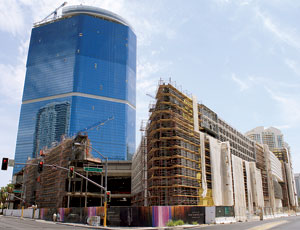The stalled $3.1-billion Fontainebleau development on the Las Vegas Strip, which filed for bankruptcy protection in early June, is facing mounting challenges in reaching completion. On July 14, Turnberry West Construction LLC, the project’s general contractor, sued the owner and its lenders in U.S. Bankruptcy Court in Miami on a hefty $675.3-million mechanic’s lien, including 15% interest.

The 737-ft-tall, 3.4-million-sq-ft hotel-casino-retail complex, which is about 70% completed, is being built by Fontainebleau Resorts LLC, an investment group led by Miami-based developer Jeffrey Soffer, who also owns Turnberry West Construction. “Soffer as his own general contractor can be used as another profit center,” says Bill Kionka, regional estimating manager for O’Connor Construction Management Inc., an Irvine, Calif.-based construction consultant. “He could be drawing development fees as well as fees as the project’s contractor that he would not have to share with other development partners.”
Fontainebleau’s original $1.76-billion construction contract came with a 3.54% contractor fee of $62.4 million and another $1.46-million soft-cost fee, the Miami lawsuit says. As of June 4, the project had $319.3 million of unpaid additional or changed work. Soffer’s move to sue himself leaves little money left to satisfy more than $112 million of mechanic’s liens filed by subcontractors. Many had worked without pay in good faith earlier this year as the recession deepened and new jobs became scarce.
Most subs have been financially stung by the project, and many now are in court struggling to get paid. They are seeking a special committee in the bankruptcy court to protect their claims resulting from Soffer’s conflicting role as both general contractor and developer. Subs also have lobbied to move the Miami case to a court in Nevada where lien laws are tougher. At least three subcontractor-related lawsuits have been filed for nonpayment.
CCCS International, Summerville, S.C., says there was “over $40 million in overpayments stemming from Fontaine-bleau’s fraudulent billing practices.” Last fall, Fontainebleau Resorts hired CCCS to “perform various construction management and auditing services.” It blames the developer for failing “to adequately design, supervise, coordinate, plan and schedule all the work at the project, which resulted in significant delays, disruptions, alterations and hardship on many subcontractors,” says the company’s lawsuit, filed on May 12 in the U.S. District Court in Nevada. The company is seeking $1 million in fees.
A recent estimate puts the cost of completing the project at $1.5 billion, nearly double the amount previously thought, yet lead lender Bank of America estimates Fontainebleau would be worth only $1.764 billion if completed by May 2010, say court documents. In late April, Fontainebleau Resorts sued the project’s 11 lenders in Clark County District Court for reneging on $800 million of pre- arranged financing needed for construction completion. This is “nothing more than the banks’ baseless attempt to walk away from the project and abandon their obligations,” says the lawsuit. Fontainebleau’s top executive, Glenn Schaeffer, resigned shortly thereafter.
“The longer it goes uncompleted, the more expensive it is going to be to complete,” says David Shields, construction management program director at the University of Nevada, Las Vegas. “It would be really hard to get people to work on the project.” Adds Bruce D’Agostino, CEO of the Construction Management Association of America, McLean, Va. “The biggest challenge is getting the team back. You really need to begin with a complete audit.”
Fontainebleau had 3,300 workers onsite earlier this year, and the project came to an unexpected stop as construction funding ran dry. A handful of workers are still on-site making the building weathertight. Exposure to the elements reportedly has damaged portions of the interior, say industry sources.


Post a comment to this article
Report Abusive Comment